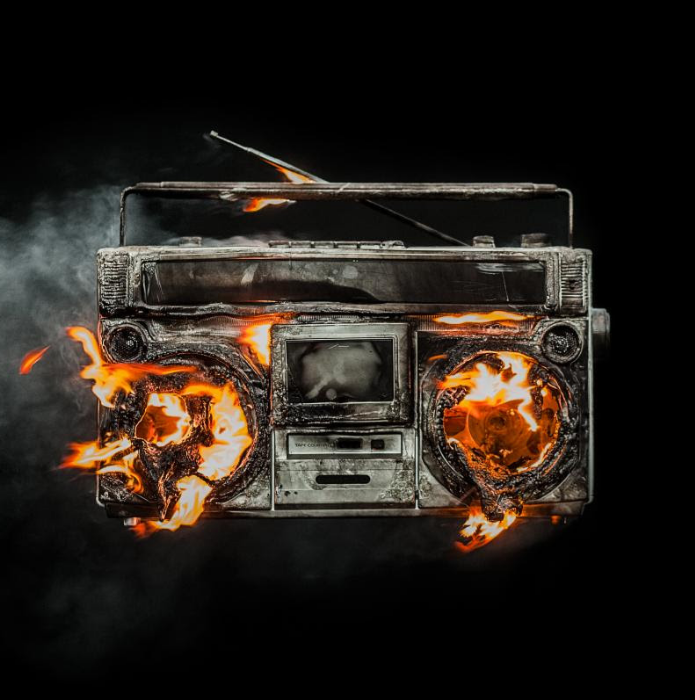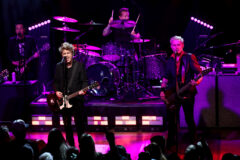On December 31, 2015, Green Day frontman Billie Joe Armstrong sent out a rare tweet. He wrote, “my mission for 2016? to destroy the phrase ‘pop-punk’ forever.” It was a shot heard ‘round the internet, intended to start his own revolution. Eight months later, Green Day announced Revolution Radio, the band’s first album in four years, and a record written with the objective of ridding themselves of the genre signifier they served to popularize more so than any other band. (Blink-182 comes close, but without BJA and crew, there would be no “Small Things,” no pop-punk as we know it today.) Green Day haven’t fully removed themselves from the hyphenated term, but on Revolution Radio, they serve to complicate it.
In 2012, Green Day released a trio full-lengths: ¡Uno!, ¡Dos!, ¡Tre! The overly ambitious offering seemed to be symptomatic of Armstrong’s never-ending attempts at reinvention. Following the success of their 2004 rock opera American Idiot, Billie and band felt pressure to do something big and innovative when the rest of the world–namely, rock radio–seemed to lose interest in guitar-based music. It became an obsession at the cost of Billie Joe’s health. He spiraled into alcohol abuse, later pills, and was forced to check into rehab following a particularly challenging-to-watch meltdown at the 2012 iHeartRadio Awards. Green Day had burned themselves out.
Now four years sober, Billie Joe set out to get back to basics with his band’s 12th studio album, one bassist Mike Dirnt detailed to Rolling Stone as writing “in the same way as if we practiced [their second album, 1992’s] Kerplunk … without thinking about it like that.” In the modern era, it’s unusual to think of Green Day releasing an album without gimmick—gimmick is what canonized American Idiot—but before Dubya took office, the band largely avoided self-seriousness. Revolution Radio manages to do both—there’s cultural critique, but there’s also a certain lighthearted silliness to the record (from “Bouncing Off the Wall”: “It’s all that I want and I want to be free / Got Satan riding next to me/ ‘Cause we’re all bloody freaks / And we’ll give you the creeps”). The latter mood is an element they seemed to have forgotten about for a few years there.
Revolution Radio opens with “Somewhere Now,” an Americana-affected folk song Armstrong kicks off with “I’m running late to somewhere now that I don’t want to be,” perhaps a critique on mundanity, the 9-to-5 work lifestyle he’s historically railed against, or perhaps something much more self-destructive—an aversion to treatment. When the song reaches its chorus, he croons, “All grown up and medicated,” reaching some kind of understanding with both. Musically, the song feels like the Who-gone-Hot Topic, a cacophonous combination of highs and lows that simultaneously mirror and detract from the song’s narrative.
“Bang Bang,” the next track and the album’s first single, has more direction—Green Day are at their heaviest here and Armstrong sings from the perspective of a mass shooter: “Bang bang, give me fame / Shoot me up to entertain / I am a semiautomatic lonely boy / You’re dead / I’m well fed.” It’s both insensitive and hits close to home, cringe-worthy only in the way American Idiot was when it was first released—massively melodic and uncomfortable to listen to, fundamentally “too soon.”
“Revolution Radio,” the album’s title track, catches Green Day showcasing their most mature version of pop-punk. There’s no beating around the bush here—ascending power chords are performed both palm-muted and otherwise, Armstrong references the Black Lives Matter movement, singing a simile of “Arms up in the sky like you want to testify.” “Say Goodbye” follows in that sociopolitical tradition with distorted honky-tonk handclaps straight out of Nashville. Post-American Idiot Green Day is obsessed with injustice, both internally and socially—the song is unafraid of tackling America’s problem with race, focusing on images of armored vehicles descending upon Ferguson. Punk rock has always excelled at looking outward, but pop-punk not so much: It’s a form of music kitty-corner to emo, where narratives are most commonly focused on the interior, dealing with interpersonal relationships and the like. Green Day splits the difference between the two, with songs about modern society and battles with addiction.
Pop-punk has also never been a genre known for its power ballads and, ironically enough, it’s a songwriting style Green Day have always excelled at. For this reason, “Outlaws” is a surprising Revolution Radio standout, recalling some of the delicate, Queen-influenced moments from My Chemical Romance’s The Black Parade—sensitive music that feels large.
The rest of the record varies: “Bouncing Off the Wall” could be an American Idiot B-Side. “Too Dumb to Die” recalls Alkaline Trio’s “We’ve Had Enough,” Armstrong performing to the lowest realms of his register. “Forever Now” is the most ambitious song on the record, topping in at seven minutes featuring mini-moments a la “Jesus of Suburbia.” Green Day ask for revolution, but do so in a toned-down fashion—it teeters the line between the desire to make something and the frustration of trying to figure out how to do so.
When Billie Joe wrote that he wanted to “destroy the phrase ‘pop-punk’ forever,” his attack was specific to the verbiage. There’s nothing wrong with a genre as long as the musicians making it refuse to hit a ceiling—as long as they ignore the sorts of sonic limitations typically prescribed to “pop-punk.” It’s hard to think Green Day have ever once considered staying true to a particular music style—their 21st-century successes have taken several forms, including a Broadway musical and a soon-to-be-released HBO film, that’s plain to see—they’re much more about message now. Revolution Radio is pop-punk and is not pop-punk. Perhaps Armstrong needs to find a new word for it.





